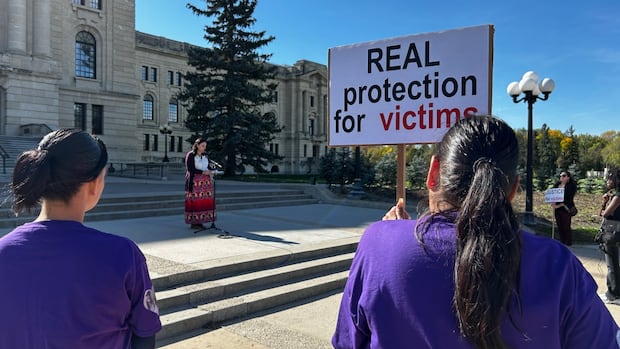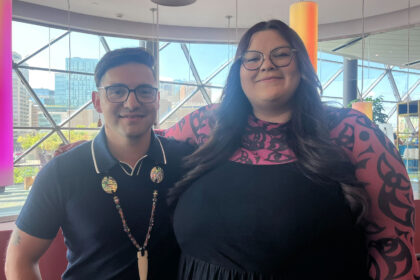SaskatchewanCommunity members, advocates and grieving family members gathered at the Saskatchewan Legislature Saturday to rally in support of justice reform survivors of intimate partner violence and sexual assault.Advocates urge government to call intimate domestic violence an epidemic Sarah Onyango · CBC News · Posted: Sep 27, 2025 6:34 PM EDT | Last Updated: 4 hours agoGrieving family members, survivors and advocates gathered in Regina Saturday in support of those who have dealt with intimate partner violence and sexual assault. (Cory Herperger/Radio-Canada)Standing in Regina’s Wascana Centre on Saturday, Andrea Naytowhow fought back tears as she spoke about her niece, Melissa Bear, who was eight months pregnant when she was killed in what her aunt says was a case of domestic violence.”This relationship escalated, and during this time there was a no-contact order,” said Naytowhow, one of the people who attended at Saturday rally for in support of those who have dealt with intimate partner violence and sexual assault.”Nobody checked up on her. This is where our system fails.” Bear, 33, was eight months pregnant with a daughter when she was killed in Saskatoon on Aug. 29, 2023.Cary Daniel Bluebell, who had been ordered by the court to have no contact with her, was supposed to appear in provincial court on the day she died.Bluebell pleaded guilty to manslaughter in her death in November 2024 and received a 15-year sentence.Naytowhow said the manslaughter conviction doesn’t reflect the severity of what happened.”He’s going to be out in a few years,” she said. “It feels like a slap on the wrist.”The lack of accountability in court, and the fact that Bluebell appeared only once in person during multiple court dates, has deepened the family’s pain, said Naytowhow.”He’s responsible for taking Melissa and baby’s life. And I want to say, baby had no say.” Andrea Naytowhow and her family came to a rally in Regina on Saturday with a message of justice for Melissa Bear, Naytowhow’s niece. Bear was eight months pregnant when she was killed in what her aunt says was a case of domestic violence. (Sarah Onyango/CBC)Saturday’s rally was organized by Brenda Ottenbreit, a survivor of intimate partner violence and the founding member of Safe Child Saskatchewan, a not-for-profit focused on the safety and rights of children.Ottenbreit left her partner in 2014 but says more than a decade later, the abuse hasn’t stopped — it’s just changed form. “When I start saying … ‘I left in 2014 and I’m still going back to family court,’ people look at me like it’s a one-off,” said Ottenbreit. “When you’re dealing with coercive control and domestic violence, this isn’t a one-off.” Ottenbreit says she endured psychological abuse, silent treatment and financial control, and says even after documented issues in court, she was ordered to share decision-making with someone who refuses to communicate.”Why couldn’t the judge understand that that’s not possible? If they’re not willing to communicate, how do you co-operate and co-parent? It’s just not something that happens,” she said. Brenda Ottenbreit and other advocates called on the provincial and federal governments to call intimate domestic violence an epidemic in Saskatchewan. (Cory Herperger/Radio-Canada)She and other advocates called on the provincial and federal governments to call intimate domestic violence an epidemic in the province. “I really think people need to understand how serious the situation is,” said Ottenbreit. “It’s not a topic that people want to talk about, and it means looking at ourselves and accepting accountability for where we may have not behaved appropriately, and that’s not always easy for people.” Legal system a challenge for survivors: PATHSCrystal Giesbrecht, research director at the Provincial Association of Transition Houses and Services of Saskatchewan, or PATHS, says survivors across Saskatchewan face harm from the legal system, especially family court. “At PATHS, we are doing research on the experiences of survivors when they’re dealing with the legal system broadly,” said Giesbrecht. “What we have now is a really good understanding of what the issues are and how difficult, how absolutely difficult the family court system and the whole legal system is for survivors in Saskatchewan.”Crystal Geisbrecht, the director of research with PATHS, says the organization is creating strategies to reduce the harm for those who have experienced domestic violence as they navigate the family court system. (Cory Herperger/Radio-Canada)PATHS, which represents 26 shelters and counselling agencies, is seeing rising demand for services, said Giesbrecht, which points to a need to focus on prevention. She stressed that abuse isn’t always physical, pointing to coercive control and emotional manipulation as other types of abuse.”[There’s] the concept of coercive control, which we’ve been discussing a lot more recently, but that’s still a very new idea for people. And I think it’s really important to recognize that violence and abuse is not OK, that it does take different forms,” she said. She also warned of growing online misogyny and rhetoric glorifying violence against women, particularly among youth. “So we have to remain vigilant and we have to be really recognizing and calling out those attitudes and behaviours,” Giesbrecht said.That means “continuing to have those conversations and try to undo some of those harmful narratives, not just with young people, but with people of all ages.” For Naytowhow, attending Saturday’s rally honours her niece and the child she never got to meet. Her family also plans to attend an Oct. 4 vigil for missing and murdered Indigenous women and two-spirit people in Saskatoon.”I think the more our government will listen to the people who are here grieving, and the more we have these rallies, I hope the more people will turn out … and we’ll seek that, seek justice within the court system.” ABOUT THE AUTHORSarah Onyango is a reporter and producer at CBC Saskatchewan. She holds a bachelor’s degree in journalism at the University of Regina. Sarah is passionate about diverse storytelling in Saskatchewan. She can be reached at sarah.onyango@cbc.ca
‘This is where our system fails’: Regina rally calls for action on intimate partner violence











